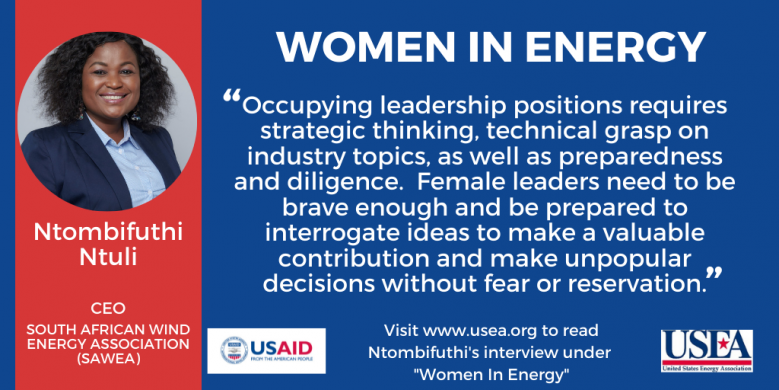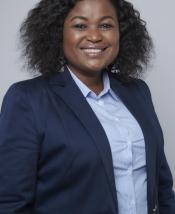
Women In Energy: Ntombifuthi Ntuli
The Women in Energy series is a joint project between USEA and USAID that was developed out of USEA’s Engendering Utilities Partnership, a program funded by USAID to improve gender policies and gender outcomes at their respective organizations.

Every month we feature a woman who has shown exemplary leadership. We want to showcase your story this month. The women among you come from diverse backgrounds and roles, and they bring with them a unique perspective to gender equality within the energy sector.

Ms. Ntombifuthi Ntuli is the CEO of the South African Wind Energy Association (SAWEA). She was appointed to this leadership position in September 2019 and is tasked with steering the industry as it takes a central role in South Africa’s energy transition, by drawing on her deep knowledge and talents gained during 14 Years of experience in the energy and related sectors.
She has a strong background Renewable Energy policy and research environments having previously worked for the CSIR as a Research Group Leader: Energy Industry, where she focused on assessing the economic impacts of the energy sector transition including, jobs, SMME development, industrialisation as well as socio-economic development.
Ntombifuthi holds an MPhil Degree in Energy Studies (University of Johannesburg) and a Certificate in Economic and Development Policy (University of Witwatersrand). She is an Alumna of the United States International Visitor Leadership Programme (IVLP) as well as the African Programme on Rethinking Development Economics (APORDE). Previously she worked for the Department of Trade and Industry as a Director: Green Industries, where she was responsible for facilitating the development of the local renewable energy manufacturing industry. Before joining the DTI, she spent 3 years at the Embassy of Denmark working as a Coordinator for the Business to Business Programme, where she facilitated business linkages between Danish and South African companies. Prior to that she spent 7 years in Ekurhuleni Metropolitan Municipality working on Energy and Climate Change programmes.
*USEA does not alter the substance of the responses from the women featured. The answers are their own.
Women in Energy Interview Questions
How have your education and career path led you to where you are now?
“I did my undergraduate studies in Environmental Health and in my early career started working as an Environmental Health Officer/ Health Inspector. I soon realized that I did not enjoy the job and I wanted to focus on more environmental management aspects than health. Fortunately, at the municipality I was working for was opening an environmental management department, and I got the opportunity to join the department as Environmental Officer focusing on Energy & Climate Change. I was therefore responsible for development and implementation of the City’s Energy & Climate Change strategy. I initiated a number of projects, including retrofitting of municipal buildings, solar water heaters, landfill gas, etc. During that time, I enrolled for a Masters Degree in Energy Studies and got to work with the Enerkey Programme which was a cooperation between German & South African Universities, Municipalities and Private Sector. I led a module on carbon trading, which I wrote my Master Thesis on and spend a couple of months in Germany interviewing energy companies that were buyers of carbon credits.
While completing my Masters I started working for the Embassy of Denmark, coordinating a B2B programme, which was a grant fund meant to assist Danish and South African companies, mostly in the energy sector, to form business partnerships. I later Joined the Department of Trade and Industry as Director: Renewable Energy Industries. In this role I got deeply entrenched in the renewable energy sector, where I was responsible for renewable energy industry development through local content requirements, government incentive, promotion of investment opportunities in the sector, etc. In 2016 I left government and joined the Council for Scientific and Industrial Research (CSIR) Energy Centre, where I set up a Research Group within that focused on analysing the economic impacts of energy sector transition in South Africa. At the same time, I was elected into the Board of the South African Wind Energy Association (SAWEA). In 2019 I was appointed CEO of SAWEA where I’m currently responsible for advocating for growth and development of the wind energy sector. I’m also currently doing a Masters in Business Administration with the European Business School of Barcelona (ENEB) and have just completed a training programme with Gordon’s Institute of Business Science on Strategic Leadership. I believe in continuously developing my skills in order to be more prepared for demands that come with being a female executive.”
Over the course of your career, have you witnessed changes in the sector that have launched more women into leadership positions?
“I can say that pockets of change are happening in terms of women appointments in leadership roles. In recent years we are seeing more companies appointing women in leadership and decision-making roles. however, we are still very far from reaching gender parity in corporate environments in the energy sector. With increased access to education for women – especially in previously male-dominated sectors like engineering and the sciences – one would assume that this places women on par with men when it comes to economic participation and opportunity. Sadly, the numbers prove otherwise.
Government policies and regulation (like the South African Employment Equity Act) play a significant role in accelerating gender balance in the workplace, and in leadership positions. However, I believe that change on a society-level is needed before we talk about workplace and policy changes. In society, nurturing and caregiving roles in households, for the most part, automatically fall on women, leaving them little time to dedicate to education and advancing their careers. Family members, particularly men, can play a significant supporting role for women who have a demanding career, since women are equally important in providing financial support to the family. This should compel all family members to share the caregiving responsibilities and become more involved in parenting and running of the family.
Another key social change is mentorship within the family: it is very important to groom young women so that they develop aspirations to become managers and leaders. Lastly, the education system needs to encourage women as early as primary school to embrace careers that were previously male dominated.”
Technology is transforming the traditional utility business model into a more modern interactive grid. Some utilities view this transformation as an opportunity to focus on change management and diversity. Research provides compelling evidence that inclusion and diversity unlock innovation and drives better business performance. What, if anything, is your organization doing to attract, retain, and promote more women into senior management positions to respond to the dramatic industry transformation?
“I totally agree inclusion and diversity unlock innovation and drives better business performance. One of the benefits of having women in the corporate leadership roles is gaining a different perspective and innovative thinking coupled with emotional intelligence that women display, which ensures balance between achieving the bottom line and making a significant social impact.
In 2018 SAWEA launched an Industry Commitment Statement supported by all our members. Amongst other things, the industry committed to sound management and employment practices and policies, creating a safe, ethical and enabling workplace culture and environment, developing industry-relevant skills and creating opportunities for youth and women in particular to enter and thrive in our industry. The aim of this commitment over time is to transform and diversify leadership at all levels in the South African wind energy sector.
The most glaring observation in the industry is the fact that women are appointed in positions which require soft skills, such as HR, socio-economic development, environmental management, etc. This is evidenced by the observation of gender balance in SAWEA working groups (WGs). The technically inclined working groups such as Operational Assets WG, Technical WG and Manufacturers WG have more than 90% male participation, while the Economic Development WG, Environment WG and Policy WG are more dominated by women. This requires the industry to take a solid action towards mentoring young female Engineers in the sector so they become more involved in technical discussions, which exposes them to future leadership positions.”
Are talented women within your organization making it to top leadership positions? Why/why not?
“Our industry is still at infant stages, started about 10 years ago, so the progress made in achieving diversity in leadership roles within the sector is quite commendable. We have quite a few wind farm companies that are led by women CEOs and we have seen women appointed in other management roles and as part of Board of Directors of companies within our industry. SAWEA as an organisation has a female CEO (the previous CEO was also female) and a female Board Chairperson. Our Board of Directors consists of 50% females. With that said, living up to our commitment statement and putting concrete and deliberate plans to realise it will increase prospects for more women being appointed in leadership positions.
Occupying leadership positions requires strategic thinking, technical grasp on industry topics, as well as preparedness and diligence. Female leaders need to be brave enough and be prepared to interrogate ideas to make a valuable contribution and make unpopular decisions without fear or reservation.”
Companies that embrace diversity outperform their competitors. What type of diversity programs does your organization have in place to mentor future women leaders? How does your organization measure and report gender diversity? Is the data publicly available?
“While SAWEA does not have specific mentorship programme, two women leaders from our industry, Ms. Mercia Grimbeek (SAWEA Board Chairperson) and Ms. Karen de Bruyn (Head of Development with one of our member companies) have founded an NPO called WE Connect. WE Connect is an association for women in renewable energy, started by two committed and fervent female leaders in the industry with the idea of providing a platform for women in the renewable energy industry to connect and grow their networks, by meeting, engaging, forming relationships, mentorship, coaching, nurturing young female talent and supporting one other’s career growth. I am excited about the opportunities they create and I have no doubt that this project will yield positive results for the renewable energy industry. The sector has a visible vacuum of female leaders, and WE Connect launched at the right time when women in the renewable energy sector need an opportunity to form close networks and learn from one another and even more importantly learn from male leaders in the industry, in order to step up.
We have not started measuring and reporting on gender diversity in the wind industry, but this is definitely part of our plans for 2021 and this will feed directly on our reporting on achievements of the industry commitment statement.”
What actions should the energy and electricity sector be focused on to accelerate change, increase diversity, and foster a better gender balance in the boardroom?
“The sector needs to set targets and have focused programmes in place to accelerate gender balance in the boardrooms. One of the ways to achieve this is setting up dedicated bursary programmes for women which will develop their technical and leadership skills and get them prepared for promotion opportunities in the sector. The sector can also initiate mentorship programmes which increases exposure of young talent to the leadership environments as well as opportunities to engage with international organisations, through speaking opportunities at industry conferences and other platforms. The Global Wind Energy Council’s Global Leadership programme, which some of the women in South African wind energy sector have participated in, provides women with opportunities such as access to networks, global developments in the industry and the opportunity to contribute on a global level. The prospects for women entering the energy space look encouraging if these programmes are result focused.”
